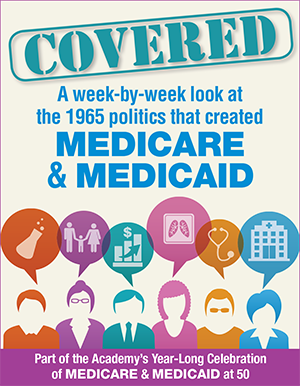Bob Rosenblatt, Special Correspondent
Throughout 2015, the Academy is working with partners to create a platform for dialogue around the history and future of these two vital programs, including this weekly Covered blog series. Covered is written by Bob Rosenblatt, a Senior Fellow at the National Academy of Social Insurance and editor of the website HelpWithAging. Learn more about the Academy’s celebration of the 50th anniversary of Medicare and Medicaid.
White House in Political Battle Between Medical Specialists, Labor
June 12, 1965
By Bob Rosenblatt, Special Correspondent
Washington, DC – The Senate plan for hospital insurance for Americans over 65 won’t cover the work of key specialists consumers rely on in hospitals, such as anesthesiologists and radiologists. Supporters of the new hospital benefit, called Medicare, say this omission may cause confusion for patients and hospitals and add both paperwork and complexity to the billing process.
Hospital-based specialists were included in the bill that passed the Senate last year, but were dropped in the current version. Medicare legislation passed the House in March without including the specialists. Senate approval is likely but key details are not yet completed and the final Senate version of the bill could be amended significantly.
The AFL-CIO, an early and strong backer of the Medicare legislation has poured significant resources into building grassroots support for the idea. But it says the Senate bill as currently drafted is flawed. The Senate bill “would constitute an unfortunate form of governmental interference with medical practice,” Nelson Cruikshank, director of the Social Security department of the AFL-CIO, told the Senate Finance Committee on May 3. The federal government would be “forcing hospitals to change their present arrangements with specialists, to arrangements that are substantially less desirable from the point of view of the patient and the public,” he said.
The Johnson Administration hasn’t explained why handling of the specialists’ billing was changed. But the move may be designed to head off some of the opposition of the medical profession to the bill, which many doctors denounce as “socialized medicine.” Sources also indicated that Rep. Wilbur Mills (D-AR), the powerful chairman of the House Ways and Means Committee, wanted the specialists’ work severed from the Medicare hospital benefit. Mills played a key role in designing the legislative package and getting it through the House – something it failed to do last year.
Excluding radiologists, pathologists and anesthesiologists from hospital coverage would be a major change from how private coverage handles these specialists. Today, their work is billed by the hospital, whether the doctor is a staff member at the hospital or is in private practice and does some work for the hospital. The total hospital bill given to the patient and his or her insurance company includes the charges for these specialists.
The legislation offered by the Administration, and approved by the House, strips the work of these doctors from Medicare Part A, which would cover 60 days of hospital care during a spell of illness. Essentially, Part A would cover the cost of maintaining a patient in the hospital but not the medical procedures.
Instead, bills from the anesthesiologists, radiologists, and other doctors, such as surgeons, would all be included in Part B of the Medicare package. This is a voluntary insurance program with a $6 monthly premium, $3 paid by the individual and $3 paid by the federal government through general taxpayer revenues.
The result would be a confusing change for both doctors and patients. Hospitals will now be required to track the work of these specialists and send out the bills under the separate Part B designation, opponents say.
The change would be “very damaging,” Joseph V. Terenzio, executive director of the Brooklyn Hospital, told the Senate Finance Committee on May 4. “Over the years the services of these specialists departments have been developed in hospitals as an integral part of hospital services. This was essential in order to make readily available such services which were generally needed by all patients and which are absolutely essential to maintaining high levels of medical practice in hospitals.”
Doctors and hospitals worked out the billing procedures locally. “We feel strongly that it is totally out of order for the Federal Government, through the present language in this bill, to dictate one nationwide pattern of relationships between hospitals and these physician specialists,” Terenzio said.
Doctors have been deeply skeptical of the Medicare proposal from the beginning. But now they are joined in an unusual alliance on the smaller issue of whether the medical specialists will bill separately under Medicare Part B for their work. Their new allies are the enthusiastic backers of Medicare, such as the AFL-CIO.
► Directory of COVERED posts
► Read the next post in the COVERED series, “Senate Finance Committee Attacks White House Bill”
► Learn more about the Academy’s celebration of the 50th anniversary of the enactment of Medicare and Medicaid

